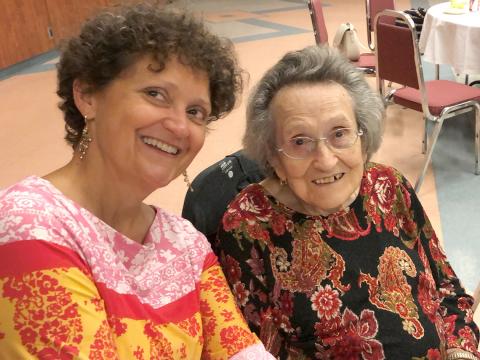Adult Care Resources Are Available to NIH’ers

Photo: Martina Lavrisha
NIH clinical research nurse Martina Lavrisha knew something was wrong when her mother—a devout Catholic who attended services daily for most of her 98 years—started talking about not going to church. Her hearing, she complained, was too poor to hear the priest, so what was the point?
The unexpected change alarmed Lavrisha and her eight siblings. “This woman has gone to church every single day for her entire life,” she explains, noting that her mother also had trouble identifying family members because she could not see or hear who was entering her home. “We had been talking with her about getting hearing aids, but it’s hard to get a consensus.”
While the challenges of aging were hitting home in a new way, Lavrisha was familiar with the topic. Throughout her nursing career, she worked primarily with senior patients and, at the beginning of 2018, began leveraging her expertise as a voting member of the NIH aging and adult dependent care committee. At her first committee meeting in February, she learned about a resource that she thought might help her family get the help they needed: the NIH adult dependent care resource and referral services hotline.
“I thought, let me try it out,” Lavrisha recalls.
An intake specialist recorded Lavrisha’s concerns, noting that her mother resides out of state. Lavrisha says she received an email from a resource specialist within 24 hours. The specialist offered Lavrisha contact information for hearing specialists in her mother’s area. She also offered tailored advice, including ways her mother’s local library services could benefit her with assistive technologies. With the new information, Lavrisha and her siblings arranged for her mother to see a hearing specialist and receive hearing aids.
More Adult Care Resources
NIH has contracted with Bright Horizons to offer employees access to back-up care when they need to be at work and their regular adult care is unavailable. NIH federal employees have access to in-home adult care and self-care—when they need it. Care can be provided in your home or in your loved one’s home all over the United States.
There is also the Adult_Care_Support Listserv. It allows the NIH community to share information and resources on all aspects of aging and adult and elder care.
More information about each of these services can be found at https://www.childfamilycare.ors.nih.gov.
“Connecting with resources empowers caregivers,” says Tonya Lee, who manages the Child & Family Program in NIH’s Office of Research Services. “Whether you are providing care within your own home or from across the country, all caregivers deserve help. My office is excited to offer this and other resources to make caregiving easier for the NIH’s dedicated employees.”
Debra Thangarajah, a management analyst at the National Institute of Nursing Research, knows how important that extra help can be in times of crisis.
Thangarajah learned about the hotline at NIH Safety, Health & Wellness Day, after which she called to learn about at-home dialysis support resources for her father. A consultant was able to review some of her options. “I felt very supported. She contacted several resources in the at-home medical care community on my behalf and provided a thorough response very quickly,” Thangarajah recalls.
Her father’s health deteriorated the following year and a serious medical crisis landed him in the intensive care unit. When the social work team at the hospital told her mother that she needed to identify a rehabilitation facility for him, Thangarajah remembered how helpful the hotline had been. She called again and the same consultant was able to help her find facilities and show her how to locate credible ratings.
“She made a difficult process much easier,” Thangarajah says. “The situation was never going to be easy, but I would have been at a real loss without somebody knowledgeable to turn to.”
After her father passed away, Thangarajah called the hotline a third time to access legal and financial services in support of her mother. She was connected with a consultant who had previously been employed by the IRS and she was given information about how to compile the appropriate tax paperwork for her mother’s situation, which eased her mother’s concerns. “It was all-hands-on-deck to help me,” Thangarajah says. “Without these resources, I would not have been able to support my parents as effectively.”
For Lavrisha, the hotline had a tangible effect on her own life and her mother’s. “She’s now able to hear what the priest is saying at church. The hearing aids have really helped,” says Lavrisha. “I think [the resource and referral services] is great because it streamlines the process of finding community resources. It’s a great service. I highly recommend it.”
“Managing the care of an aging loved one can be overwhelming,” says Lee. “Many people don’t know where to start and don’t realize the many resources that may be available to them. The resource and referral service is a great first step that allows NIH employees to describe their individual situation and receive personalized advice and referrals.”
Free to all NIH employees, trainees and contractors, this confidential service is open Monday through Friday, 8 a.m.-5 p.m. It can be reached by dialing 1-800-777-1720.
